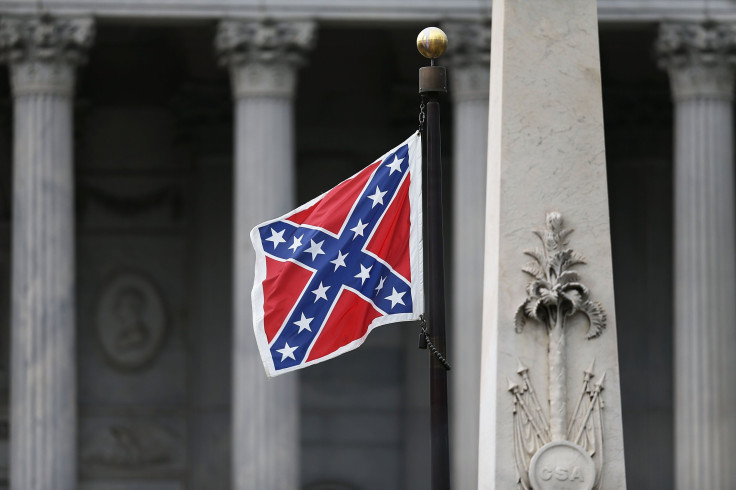Confederate Flag Manufacturers In China Respond To US Debate With Concern, Suggestions

SHANGHAI -- The debate about the future of the Confederate flag could have a knock-on impact in China, the world’s biggest producer of flags and related items.
A quick search on China’s largest sourcing website Alibaba, for example, reveals more than 400 types of made-in-China Confederate flags and related products -- from “Confederate flags on butterfly” navel rings for 62 cents a piece, to “Confederate/USA Crossed Flags Photo License Plates” for $4. There are also Confederate flag-logo iPhone covers, “attitude belt buckles," dog tags and dog collars.
News of the debate about the flag has been widely reported by Chinese news media. “Is the American Civil War not yet over?,” asked Shanghai news website The Paper on Tuesday, for example, in a story exploring the flag’s history. (The seriousness of its discussion of the topic may, however, have been undermined slightly by the fact that it illustrated the article with an image from the early 80s’ U.S. TV show, “The Dukes of Hazzard,” featuring stars John Schneider and Tom Wopat leaning on their distinctive Dodge Charger stock-car, with the Confederate flag emblazoned on its roof, accompanied by the caption: “The Confederate flag still has many supporters in the American south.”)
A random International Business Times survey of some 10 Chinese Confederate flag producers, however, found that many of them had not heard about the discussion about the flag’s future -- indeed some of them hadn’t heard about last week’s events in Charleston at all. “I didn’t get a chance to watch the news last week,” said Maggie Ma, of Qianxi Flag Co. in the central city of Wuhan. It was a view echoed by Jessie Liu, general manager of sales at Xiangying Textile in Shaoxing, south of Shanghai, who added with a sigh that she didn’t know much about the history of the U.S. Civil War era, because, “We’re always working and working, we don’t have any time to study these kind of things.”
When told about the current debate in the U.S., Liu expressed some concern: “Will they ban production?” she asked anxiously. Her company made Confederate flags to order occasionally, she said, as well as using the image on smaller plastic flags used in sales promotions, not just for the U.S. market, but for Europe too.
“It might have a small impact on us, but not a very big one,” Liu reflected -- adding that the company’s biggest sellers were the current flags of Australia, Canada and the U.S., with hundreds of thousands of the latter sold each year.
Matteo Yeung, of Kaituo Industry in Yongkang, Zhejiang province, which also advertises Confederate flags (“Minimum order: 1200”) on Alibaba.com, had heard the news of the Charleston shooting. However, he said his firm had not had too many orders for such flags in recent years -- and anyway, orders from the U.S. (and Europe) had declined recently.
But Alex Chen, sales manager at Shanghai-based supplier Totem Flags, whose website features images of hand-held mini-Confederate flags, as well as full-size flags rolling off the production line, told IBTimes that his firm had produced the flags on many occasions in the past, usually in batches of five to ten thousand.
Chen, who said he had read a bit about the history of the Civil War era, didn’t seem too concerned about the backlash against the Confederate flag, however. “I don’t think people in the U.S. will stop using this flag altogether,” he said. “It’s a tradition. If they want to change something, I think maybe they’ll change the design of the flag a little,” he suggested. “But that wouldn’t be a big problem for us, we always make to order, so we could redo the design. If we had a lot in stock then it would be a problem.”
Chen added that Confederate flags weren’t as big a money-spinner as U.S. flags for Fourth of July celebrations, or his company’s popular hand-held flags with images of presidential candidates at election time. “We didn’t make so many for Obama last time, but we made a lot of Obama flags when he won the first time," he said.
But if China’s businesses are not too worried about how the fate of the Confederate flag is resolved, some in the Chinese media say there are other debates the U.S. ought to be having in the aftermath of Charleston too. A commentary from the official Xinhua news agency noted that since the shootings, “Republican presidential hopefuls started an inter-party race to offer their somber condolences to the victims. But none of them blamed the country's gun policy,” it said.
It concluded, “It might seem common sense to ban private ownership of semi-automatic weapons and to expand background checks on gun purchases. But not in Washington.”
© Copyright IBTimes 2025. All rights reserved.






















